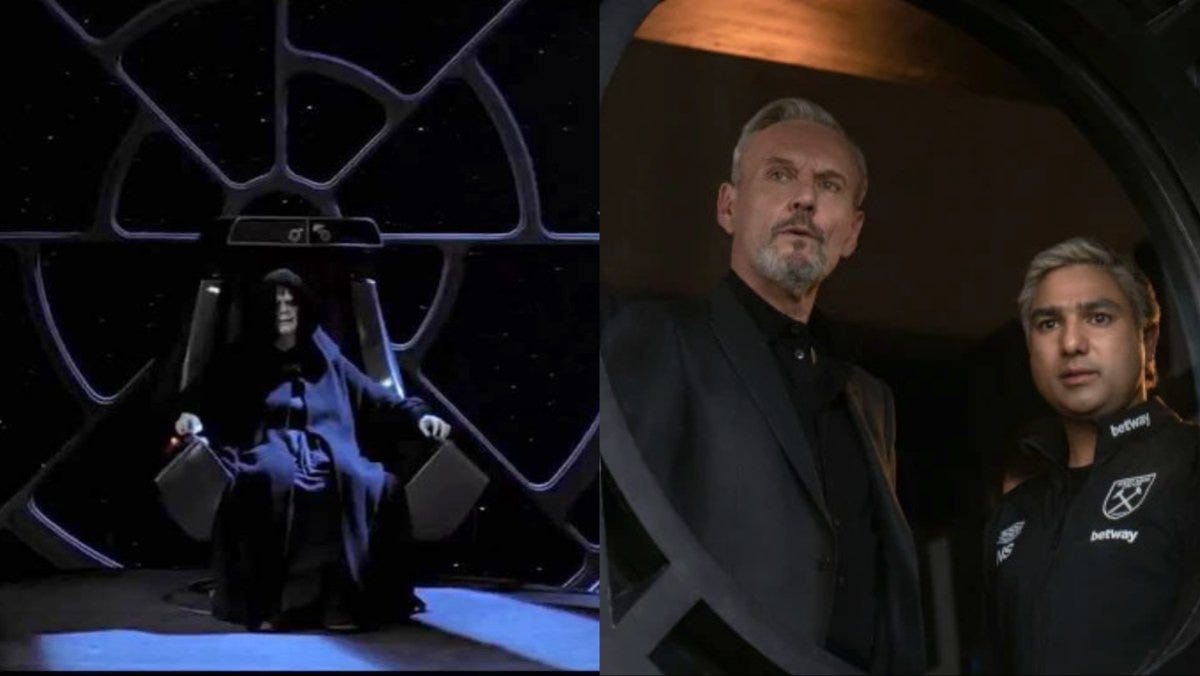Letting your team be themselves - Leadership Lessons from "Ted Lasso"
Episode 1 of Ted Lasso is out and we got a first look at the foundation for the rest of the final season.
Short version, Richmond (Ted’s team) is now in the Premier League after getting promoted last season, but the pre-season rankings have them coming in dead last. Former Richmond coach Nate Shelley is now coaching for West Ham, owned by Richmond owner Rebecca’s ex-husband, Rupert Mannion.

Things come to a head when Nate has his first press conference as the new manager of West Ham and trashes Richmond and Ted, at the prodding of Rupert.
My biggest takeaway from this episode was thinking about how we ask our teams to show up every day. Are we asking them to be something their not? If so, are we doing so to their benefit, what we think is their benefit, or is it to their detriment? More on this below.
Don't try to get them to conform
“You have to let Ted be Ted,” is early advice in the episode, and advice that through the first two seasons has worked well, but Rebecca waffles on whether that’s a tactic that she is okay with.
Especially after Ted takes the team into the sewers to get them out of their heads, Rebecca is furious. She wants Ted to go on the verbal offensive and get mean, much to Ted’s surprise. As expected, he takes the high road, choosing instead to further make fun of himself, continuing to be the butt of the joke at his own expense.
Lesson: As leaders, we shouldn’t try to get folks to conform to certain personality styles. I remember in high school, my football coach would get on me for not being mean enough. You’ve likely had a similar conversation where you want a direct report to speak up more or be louder.
We shouldn’t try to change the personalities of our teams, we should instead learn to leverage the various aspects and help amplify their voices if we want them to “be louder.”
Watch how your emotions change your style
I’ve talked in the past about leading with consistency and this first episode shows two styles that are vastly different, while also varied in consistency.
Rebecca is still dealing with her emotions around Rupert and whether she hates him, wants to embarrass him, wants to beat him at his own game, or all three.
Rupert on the other hand is consistently evil. He’ll do whatever it takes to undermine Richmond, Rebecca, and Ted. That’s why he’s worm-tongued his way into Nate’s ear. Nate isn’t an amazing coach in any regard, and Rupert knows it. He also knows he can use Nate to get back at Rebecca and Ted for embarrassing him.
Both Rebecca and Rupert let their emotions guide how they ask their employees to behave, and in both cases it’s detrimental.
Lesson: Don’t let your own emotions cloud how you are leading your team. Before you lash out or make a knee-jerk decision, try and remove your emotions from the situation. Objectively, should your style or your team’s style change?
Careful what you praise
Rupert knows exactly what he is doing with Nate. He is fluffing his ego whenever possible, molding him into a Sith Lord that will do his evil bidding. We see this directly when Nate repeats a negative joke that got a laugh from Rupert earlier in the episode “they’re only 20th because there isn’t a 21st,” har har har.
The line between manipulation and inspiration is a blurry one, but Rupert knows he is manipulating Nate. Nate is too consumed with getting the approval of others to see it and is going down a dark path. Whether it’s redeemable in the final season is to be determined.
Lesson: We must model and praise the behaviors we want to see continued, but must do so with the knowledge that if viewed incorrectly can have negative consequences.
When working with a team through the storming and norming phases, it’s critical to praise positive behaviors publicly, while working on the negative behaviors privately, surfacing the general corrections that come out of it.
By praising publicly, folks can get a better sense of what is and is not acceptable on the team and will lean toward those items that are viewed as acceptable and “correct.” Especially when it is a completely new behavior to a team, double down on the praise and review whenever possible.
Final Thoughts
Ted Lasso continues to provide an excellent look at leadership and team building, and I’m excited to see how this final season resolves itself. Sure it’s all fiction, but there are gems we can extract and examine that can act as a mirror into our own management and leadership styles.
What were your takeaways from this first episode?



